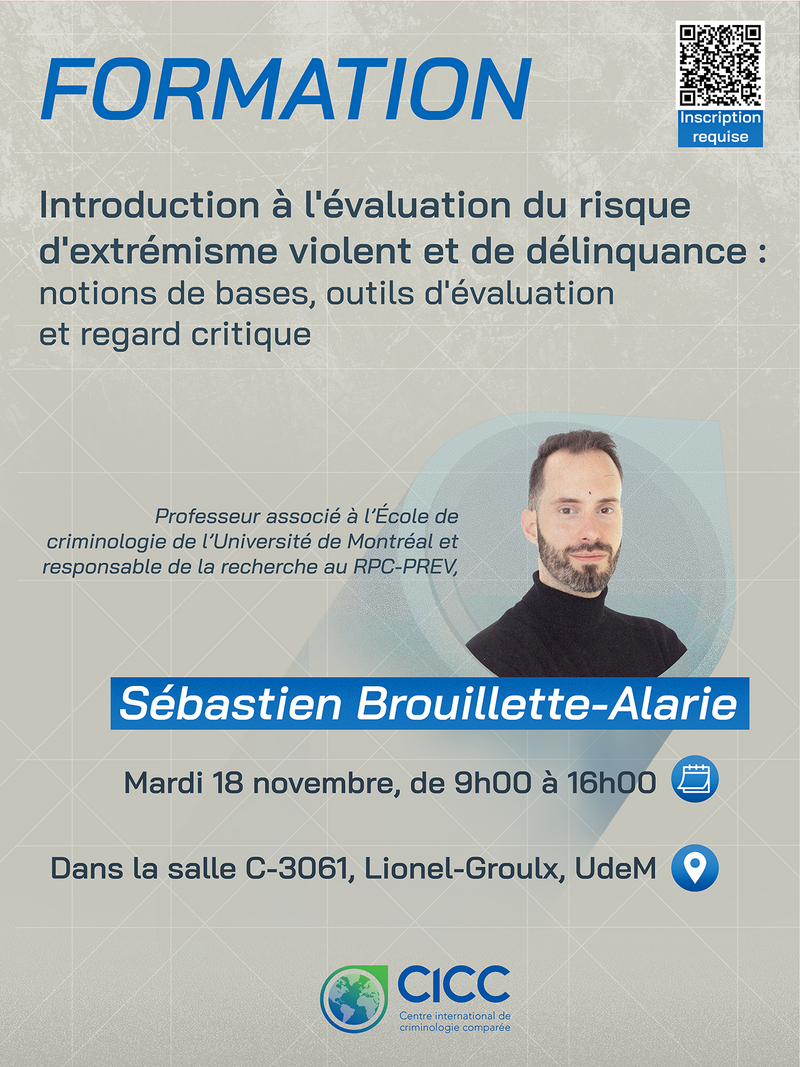
This training will be led by Professor Sébastien Brouillette-Alarie and will take place on Tuesday, November 18, 2025, from 9:00 a.m. to 4:00 p.m. in Room C-3061, Pavillon Lionel-Groulx, Université de Montréal, and via Zoom.
Risk assessment plays a central role in clinical, judicial, and preventive practices. This training provides a structured introduction to risk assessment methods in criminology and psychology, focusing on risk and protective factors, actuarial and clinical approaches, and the evolution of assessment tools over time. Special attention will be given to violent extremism prevention (VEP), a field where assessment tools raise debates and concerns.
Participants will explore the results of recent systematic reviews, learn to balance scientific rigor with ethical considerations, and discover practices adapted to sensitive contexts. Specific tensions in the VEP field — such as fears of stigmatization, inappropriate use in primary/secondary prevention, or lack of psychometric validation — will be discussed with examples from criminology. The training will also highlight overlaps between risk factors for delinquency and violent extremism.
Through interactive pedagogy, participants will gain a clearer understanding of the benefits and limits of assessment tools, reflect on their practical use in professional settings, and explore potential interdisciplinary adaptations.
This training aims to introduce participants to the conceptual and methodological foundations of risk assessment in criminology and psychology. It seeks to clarify what “risk assessment” means, distinguishing between types of risk and protective factors (static vs. dynamic) and the methods used to identify them, including systematic reviews and meta-analyses.
Participants will explore the evolution of assessment approaches — from unstructured clinical judgment to dynamic actuarial tools and case management instruments — while becoming aware of issues related to clinical override. The course offers an in-depth understanding of the link between risk assessment and psychosocial intervention, based on the principles of Risk-Need-Responsivity (RNR).
The training will cover the main tools used to assess the risk of criminal recidivism or violence, before turning to those employed in the prevention of violent extremism. In this context, participants will reflect on the limitations and controversies of existing tools, ethical concerns (stigmatization, primary/secondary prevention use), and the current lack of rigorous psychometric validation. Finally, the training will highlight research- and practice-based recommendations and explore ways to adapt tools from other domains to violent radicalization contexts.
Block 1 – 9:00 a.m. to 12:00 p.m.: Foundations of Risk Assessment in Criminology and Psychology
9:00 – 9:30: Welcome, training objectives, interactive introductions
9:30 – 10:00: What is risk assessment? Key concepts, uses, and myth deconstruction
10:00 – 10:30: Risk and protective factors: identification, dimensions, and integration into assessment tools
10:30 – 10:45: Break
10:45 – 11:30: Generations of risk assessment tools (1st–4th), examples, and clinical applications (RNR principles)
11:30 – 12:00: Limitations/biases of current tools and clinical override: when to use or not use a tool
Lunch break – 12:00 to 1:00 p.m.
Block 2 – 1:00 p.m. to 4:00 p.m.: Risk Assessment in Violent Extremism Prevention (VEP)
1:00 – 1:45: History of risk assessment in VEP: tool development, controversies, and practitioner resistance
1:45 – 2:30: Risk/protective factors for violent extremism: recent meta-analyses, overlap with psychology/criminology factors, integration into multisystem models
2:30 – 2:45: Break
2:45 – 3:15: Overview of VEP tools (e.g., ERG22+, TRAP-18, VERA-2R): common features, specificities, and uneven psychometric validation
3:15 – 3:45: Practitioner feedback: contributions to intervention vs. blind spots, guidelines for ethical and effective use
3:45 – 4:00: Conclusion and reflective discussion on the role of tools in VEP
Integrated Activity: Case study evolving throughout the training, with new elements added in each module

Sébastien Brouillette-Alarie
Associate Professor, School of Criminology, Université de Montréal; Research Lead, RPC-PREV.
Since 2018, Sébastien Brouillette-Alarie has worked in the field of violent radicalization prevention, ensuring ongoing exchange between research and practice through systematic reviews and Delphi processes. His work helps differentiate best practices from those potentially causing iatrogenic effects for individuals and communities.
Attention - Votre version d'Internet Explorer est vieille de 20 ans et peut ne pas vous offrir une expérience optimale sur le site du CICC. Veuillez mettre à jour votre ordinateur pour une expérience optimale. Nous vous recommandons Firefox ou Chrome, ou encore ChromeFrame si vous êtes dans un environnement corporatif ou académique dans lequel vous ne pouvez pas mettre à jour Internet Explorer.